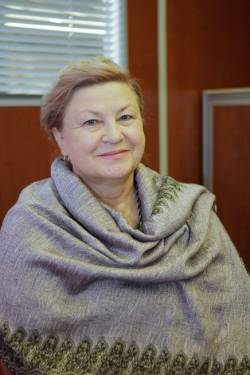 Svetlana Bashtovenko, director of Resource Center for Elderly, a HelpAge global network member, is one of the most influential activists and experts in the field of ageing in Kyrgyzstan. We talked with Svetlana about the situation older people face in her country and how, as part of the AgeNet International network, they are working to influence governments across Eurasia and the Middle East.
Svetlana Bashtovenko, director of Resource Center for Elderly, a HelpAge global network member, is one of the most influential activists and experts in the field of ageing in Kyrgyzstan. We talked with Svetlana about the situation older people face in her country and how, as part of the AgeNet International network, they are working to influence governments across Eurasia and the Middle East.
What are the main problems older people face in Kyrgyzstan?
The main problem is poverty. Pensions are often not enough, even for the most basic diet. Many older people barely survive, or live in debt.
Another important issue is the lack of healthcare. Funding is often residual – the Government just doesn’t invest in the healthcare of older people enough compared to the rest of the population. When older people come to a hospital, the doctors often don’t pay much attention to them, and then dismiss them 10 minutes later.
Loneliness is another big problem. In our country, 10% of Kyrgyzstan’s population is older people who are on their own. Nobody cares for them. Nobody listens to their needs.
Sometimes, even within families, older people’s needs are ignored and their opinions are not considered. Older people’s income is often managed by another family member, and this gives them less control or say in how it is spent.
Tell us about the AgeNet International network. How did it begin?
In 2002, Resource Center for Elderly (RCE) created the international ageing network AgeNet International, consisting of 51 organisations from 11 countries in Eurasia and the Middle East. The network also includes two organisations from England: INTRAC and HelpAge International.
The network aims to promote the responsibility of states and civil society to improve the lives of older people.
Our first large international conference on ageing issues was held in Bishkek in 2004. Other annual conferences took place in Tajikistan, Kazakhstan and Georgia. We have raised the issues of the implementation of the Madrid International Plan of Action on Ageing (MIPAA) at the grassroots level and the development of programmes that benefit older people. As a result, the Kyrgyzstan Government adopted a joint course of action on MIPAA in cooperation with AgeNet and the HelpAge global network.
What role does Resource Center for Elderly play in the AgeNet network?
RCE has been coordinating the AgeNet network for many years. In addition to the annual conference, we hold the leaders club, which are regular meetings of ageing organisations heads to coordinate joint activities.
We participate in HelpAge’s Age Demands Action campaigns and several times a year we hold fairs in Bishkek where more than 50 self-help groups of older people sell their goods. On World Diabetes Day, we organise mass sport competitions and free blood sugar screenings for everyone.
The next annual AgeNet network conference will be held in Bishkek in May 2018. What topics will it cover?
Among the themes of the conference will be the promotion of ageing issues at the national level and the role of older people in national politics. As a result of the discussions and outputs of the previous conference, the Comprehensive National Programme for Improving the Quality of Life of Older Persons for 2018-2028 in the Kyrgyzstan was recently developed. In the May conference, we will discuss how we can further influence the state structures in the implementation of this programme and how civil society can monitor the implementation.
The UN convention on the rights of older people could also be on the agenda. We see that the rights of older men and women are often violated and, while there is no unanimous support for the convention at the international level, no matter what, we are not going to stop and remain silent.
Our activities have had successful results. Kyrgyzstan established Mother’s Day after a recommendation from AgeNet. It is celebrated on the third Sunday of May and helps to highlight the role of older women in the family.
RCE conducted a recent survey among members of AgeNet International about the further development of the network. What conclusions did you draw?
The majority of organisations who participated in the survey support and praise the AgeNet network, but we see a wide range of issues that need improvement. Many members have a passive role and do not share information with other members or engage in activities. We want to encourage more active participation.
Many organisations in the network are funded by donors from Europe and America. In our region, we hardly know of any donors who would support our cause. I think it is necessary to work with donors to make them aware of the importance of the issues that older people face. Resource Center for Elderly has been a member of the HelpAge global network for many years.
How do you see this relationship develop?
We would like to receive more information about the activities of the network and we would like to become more involved in promoting the issues of ageing at the international level, in international working groups. The HelpAge global network has great opportunities and resources for this.
